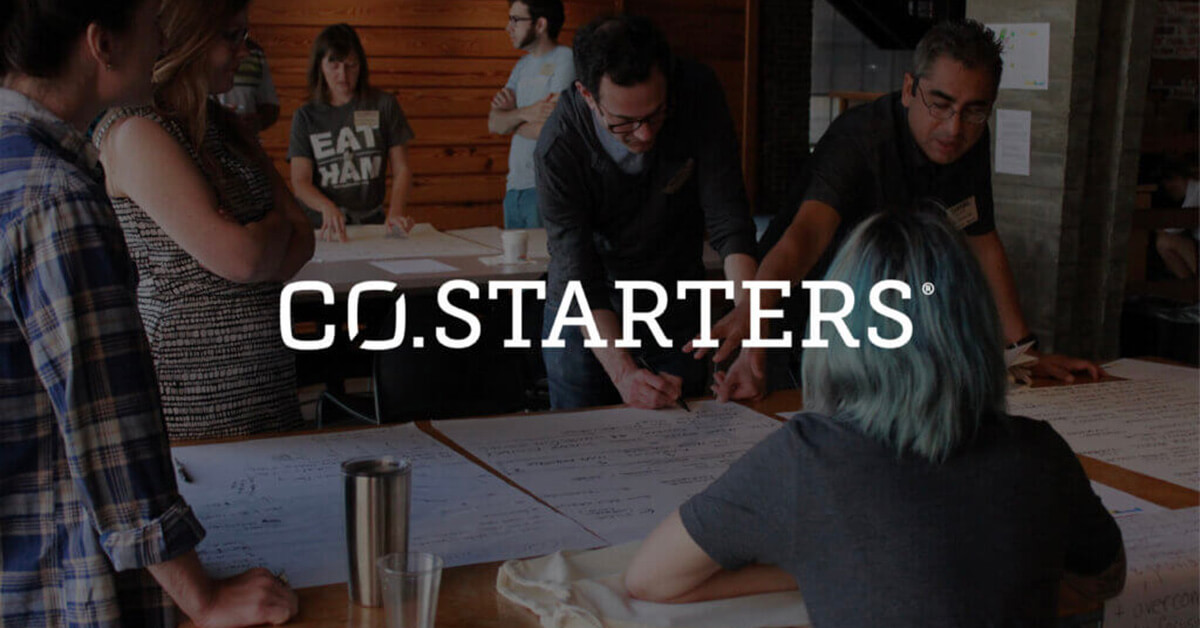Meet your Co.Starters facilitator, Eric Weisser
Eric Weisser is the CEO of Weisser Distributing, and the facilitator of Co.Starters’ inaugural cohort. We asked him a few questions about what he’s learned from building a business and why he thinks Co.Starters would be a valuable experience for early-stage entrepreneurs.
Keep reading to hear what he had to say!
The following Q&A has been edited for length and clarity.
Tell us a little about yourself and your business.
I joined our family business ten years ago as Employee #2, when we were selling automotive products and supplies on the tool trucks. That morphed into a business that started selling a few things on Amazon and Ebay. We just happened to be in the right spot at the right time, and now, 10 years later, we have three warehouses, 175 employees, north of $100 million in sales—what I like to call a real business.
Part of the business is selling national brands—things you’ve heard of, like 3M—and part of the business is private-label brands, which is a really hot topic on YouTube these days. We started doing that before it was cool, and now we have 3,000 products that we source and manufacture in China, in 18 different verticals, and we sell those all over the world on marketplaces like Amazon and Walmart.
I’m the CEO, and we have a full leadership team of excellent people that we’ve added and grown with over the years. I have the greatest job in the world—I get to work with super smart people, and our business is past that infancy startup stage. We’re just in a really good spot. This opportunity [to facilitate Co.Starters] came up, and for a number of years I had felt like I was just a taker within the community, and this was an opportunity to give back. That’s the nice way to say it, but I really enjoy working with entrepreneurs and seeing what they’re doing. It gives me energy, so selfishly, it’ll be a really fun project for me to work on, too.
Co.Starters is for entrepreneurs who are in the ideation phase, meaning they’ve identified a problem, opportunity or gap in the marketplace and need structure, support and resources to execute on their business idea. What do you consider to be the biggest challenge for entrepreneurs at this stage?
Understanding who your customer is, is really, really, really important, and then you have to understand how you get your product to that customer. It’s all about your MVP, your minimum viable product. What does it cost you all-in? What do you sell it for? What did it cost you to sell? After all that, do you have any profit left? If the answer’s no, how many do you have to sell in order to scale your business to profitability?
That was a struggle for us. My dad operated on the “You eat what you kill” philosophy. Whatever you sold that day was how you ate that night. Now, we have forecasts and budgets that we want to hit or exceed. If we don’t hit said forecast or budget, what does that mean? Those are just some of the things I got to learn along the way.
What’s something you wish you had help with when you were building your business?
Financing and banking were really big issues for us. I always tell people that my dad taught me, as a young man, that you will cower in fear in front of your banker and whatever they give you, you’ll just accept and be thankful for it. Whereas now, I know that we’re the customer, and just like I’d expect to be treated well in a restaurant or a retail store, I expect to be treated with excellent service at my bank. That was not always the case early on in our business, so that was big for us.
The other thing we didn’t have was good, clean data. My dad had this business that he ran literally on paper. The financials were squeaky clean all the way through, but we missed out on the data around inventory, what we were selling, and our pricing. It took a while to get that all cleaned up, but once it was, that really jump-started our next level of growth.
What are you most looking forward to with Co.Starters?
It’s all about the beginning for me. Who is your customer? Does your product actually have a customer? If you have swimming suits and you want to sell them in downtown Sioux Falls, well, you probably can for a few months, but does your customer actually exist in that downtown storefront? Do they even exist in wholesaling to Scheels? That’s what I really like to walk through with people. It’s not that I like shooting down ideas, but I love poking holes and asking questions to help them dig deeper.
What would you consider a success coming out of this program? What do you hope participants achieve?
The people that are successful in this are either going to be the people that figure out this isn’t for them, or more than likely, if it is for them, whatever they’re thinking of doing is not going to be their final result. At the end, I want everybody in the class to be able to say yes or no—”I have something that has legs, and I want to continue,” or it’s even okay to say, “This isn’t really for me.”
Maybe they really like baking pies or making candles, but they don’t really want to make 10,000 candles a year just to make $10,000. Maybe they don’t have the time or money to make it work. That’s okay. A success for me would be to save someone from quitting their job to make candles when it turns out, they really don’t want to. I’m a teacher at heart, and they’re going to learn a lot about themselves and what they want in business.
When you think of the entrepreneurial community in Sioux Falls, what comes to mind?
We have a community full of people who are doers and are willing to bust their butts to make anything happen. Sometimes, that’s one of the toughest things to find. The second toughest thing to find is the customer. In Sioux Falls, that can be difficult. We have limitations based on the size of our city, but our strength is that we think we can do everything. You can get started here inexpensively because land is cheap and labor is relatively good for reasonable wages. You can get started very quickly in Sioux Falls.
What do you bring to the table for this group of participants?
I come with a really positive attitude. Within my own company, I always say I think anybody can become the CEO. My general mentality is that I see great things in everybody, and I want everybody to succeed.
I have a teaching background, so patience is certainly one of my virtues. I also happen to have this business and some experience, so I can hold somebody’s hand through the tough parts. I’m not afraid to tell people how it is or what I think. I’m going to be honest with folks—sometimes it’s not what they want to hear, but my honesty is a benefit for folks in this course.
What would you tell someone who’s thinking about applying to Co.Starters?
We’re going to have fun, and you’re going to meet some really interesting people. This is not a college-level course, this is every person’s course. For most people, it’ll be new information. If you’re interested in business, the course itself will be interesting. It will make you think differently. This is not Shark Tank, you’re not going into the tank with tons of pressure. This is a private room of 10 or so people where everything is confidential.
I have another theory that, in our company, we like to fail fast. We move really fast and figure out if this is going to work or not. If it doesn’t work, we move onto the next thing. I push people to get to an answer or solution, so you’re going to know the answer to your questions by the end of this course, for sure. If you’re thinking about doing the course, don’t think any longer. Just do it.
The Co.Starters application closes this week! Apply before midnight on Friday, December 18 for your chance to be part of this inaugural cohort.

